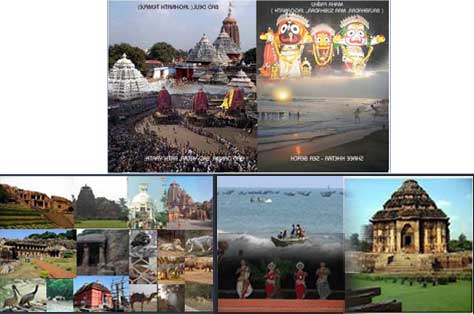Puri
The grandeur of architecture and the crafts is the main top of the high sculptures cultural speak about the history of Puri District. Puri is also known as Jagannath Dham or Purusottam khetra or Bada Deula and popularly for the adobe of Lord Jagannath and famous for annual Rath Yatra or the Car Festival, chandan yatra, many more fair and fesival, handicraft ( sand art), beautiful beaches, Chilka Lake and Simlipal National Park, Govardhana matha , Sringeri, Dwaraka,Jyotirmath, Adi Shankaracharya, Historic antiquities ,Religious sanctuaries , Architectural Grandeur , Sea-scape beauty, moderate climate etc.
 It is situated Just 62 km from Bhubaneswar. Puri is the holy city of the hindus as a part of the char dham pilgrimages. According to Hindu parmpara, without a journey to Puri Jagnnath temple a pilgrimage is not considered to complete. one of the best beaches where both sunrise and sunset can be viewed. In the festival of Rath Yatra in Puri the three deities Jagannath, Balabhadra, and Subhadra appear in the huge chariots in modern times in the temple background.
It is situated Just 62 km from Bhubaneswar. Puri is the holy city of the hindus as a part of the char dham pilgrimages. According to Hindu parmpara, without a journey to Puri Jagnnath temple a pilgrimage is not considered to complete. one of the best beaches where both sunrise and sunset can be viewed. In the festival of Rath Yatra in Puri the three deities Jagannath, Balabhadra, and Subhadra appear in the huge chariots in modern times in the temple background.The District is happy for different religions, sects and faith in course of history, Hindu, Buddhist, Jaina, Muslim, Christian, Sikh found here. Cultural program is organized on every second saturday of the month two hours, in the evening at the collector's conference Hall C (Near Sea bech Police Station) Puri by District Council of culture. Apera is the very popular mobile drama troupe in the puri. Museum is popular for different veshas of Lord Jagannath, Sculptures of various Kinds, Patta paintings palm leaf paintings, numerous varieties of Handicrafts . Bada Thakura(Lord Jagannath), Bada Danda(Grand Road), Bada Deula(Jagannath temple), Bada Raja(King of puri), Maha Prasada(cooked food from the temple), Maha Dipa(oil candel), Bad Danda(Big road) etc. are notable persons and things in Puri.
Festival
|
celebration month
|
Description
|
Car Festival (Ratha Yatra)
|
July(Ashadha)
|
in all the Jagnnath Pithas
|
Chandan Yatra
|
April( chaitra)
|
|
Gosani Yatra
|
September/October
|
Dasahara
|
Sahi Yatra
|
March/April
|
for 7 days from Rama Navami
|
Maha Shiva Ratri
|
February/March
|
in all the Saiva Pithas
|
Harirajpur Melan
|
March
|
Harirajpur
|
Aunla Navami
|
November
|
Sakshigopal
|
Makar Mela
|
January( Makar sankanti)
|
Chilika
|
Bali Harachandi Mela
|
during the Raj Festival in June
|
Brahmagiri
|
Konark
Konark is located on the Bay of Bengal, 60 kms from Bhubaneswar and 35 kms from Puri. Itis a small town in the District of Puri and one of the points of the Golden Triangle of Odisha. Konark is world famous for its unique stone carved sun temple which is dedicated to Lord Surya(sun) which is heavily decorated with stone carving and chandrabhaga with sunrise and it is also known as the Black Pagoda. Every year Thousands of people visit to this destination. It was constructed by King Narasimhadeva I (1238-1250 CE) of the Eastern Ganga Dynasty from oxidized and weathered ferruginous sandstone. The name Konark is derived from the Sanskrit word Kona (meaning corner) and word Arka means (sun). The entire complex temple was designed in the form of the God's huge chariot drawn by seven spirited horses on twelve pairs of exquisitely decorated wheels at its base.
The temple is guarded by two giant lions, which are shown crushing a war elephant. Each elephant in turn lies on top of a human body. The temple symbolizes the majestic stride of the Sun God. At the entrance of the temple is a Nata Mandir. The dancers perform their dances in homage to the Sun God. Here the stone surpasses the language of man."
Bhubaneswar
 Bhubaneswar is the capital of Odisha and a blend of century old customs cosmopolitan culture magnificent sculptures and architectural heritage. It is situated in the eastern coastal plains of Orissa and south-west of the Mahanadi River.The major tourist attractions in Bhubaneswar such as ancient temples Like Lingaraja temple, Rajarani temple, Parasuramesvera and Yogini, Handicrafts and State Museums, Khandagiri-Udayagiri Caves, Dhauligiri( kaling war) and Nandankanan Wildlife Sanctuary enthralls its visitors who long for more on their visit to the city .
Bhubaneswar is the capital of Odisha and a blend of century old customs cosmopolitan culture magnificent sculptures and architectural heritage. It is situated in the eastern coastal plains of Orissa and south-west of the Mahanadi River.The major tourist attractions in Bhubaneswar such as ancient temples Like Lingaraja temple, Rajarani temple, Parasuramesvera and Yogini, Handicrafts and State Museums, Khandagiri-Udayagiri Caves, Dhauligiri( kaling war) and Nandankanan Wildlife Sanctuary enthralls its visitors who long for more on their visit to the city .The infamous Kalinga War was held near Dhauli , located in south Bhubaneswar in the 3rd Century BCE. The Jain and Buddhist shrines give a clear picture about the settlements around Bhubaneswar in the first two centuries B.C, and one of the most complete edicts of the Mauryan emperor, Ashoka, dating between 272-236 B.C, remains carved in rock just 5 miles to the southwest of the modern city.


No comments:
Post a Comment